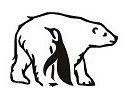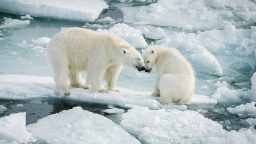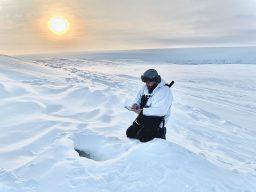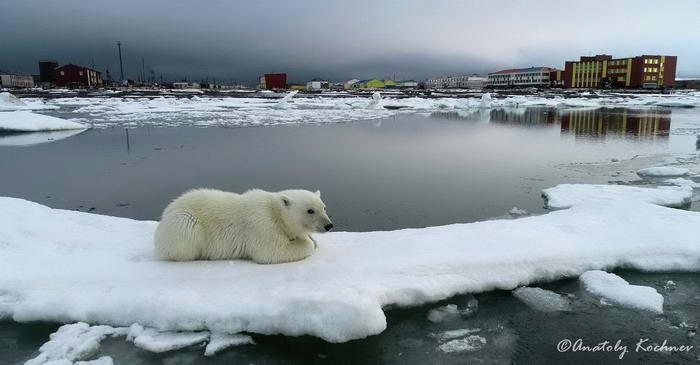
From the new one. Cosette
Cosette came to the village of Rykapiy in the last days of September. She was spotted near a fresh water mine and reported to the local “Bear Patrol”. One of the patrol officers on a motorcycle along the outskirts of the village drove Cosette to the sea. She didn’t really want to leave the shore and turned to the boarding school, from which delicious smells came from the dining room. The cook and the dishwasher jumped out onto the porch, but the patrolman with a series of flares forced Cosette to ignore the smells and plunge into the cold waters of the Chukchi Sea.
She climbed out onto the nearest ice, shook herself off and, jumping from ice floe to ice floe, moved away from the inhospitable place, to the center of the Western Bay. She was heading for the dock, where I was. Before reaching a couple of hundred meters, Cosette looked back at the village, then looked around, chose a flat ice floe, rolled on it, finally drying the wool, and lay down to rest.
She was just over a year and a half old. At that age, the cubs still stick with their mother, but Cosette, for some reason, led an independent life at such a young age. Life in the Arctic ice is difficult and full of dangers: the mother could die during a storm, a fight with a walrus or a starved cannibal male. Or they just lost each other in the vastness of the Chukchi Sea during bad weather or flight from danger.
On the other hand, 30 years ago, it was exceptionally rare for me to meet one-year-old cubs without their mother. I remember only a couple of cases on Wrangel Island, but then the cubs behaved restlessly, often roared and ran in search of their mother, from which it was clear that the breakup of the family occurred just the other day.
Cosette, on the other hand, behaved calmly. There was a feeling that she had already got used to her loneliness and the need to find food on her own. And here it should be noted that in the last decade I have almost every year seen orphaned one–year-old cubs or heard about them from my friends, hunters and volunteers of the “Bear Patrol”. Only last autumn, two more such lonely vagabonds came to Cape Schmidt, besides Cosette.
There is a feeling that climate change and, as a result, a reduction in the area of ice, affects the life cycle of polar bears. The rate of reproduction is accelerating, many females begin to reproduce more often than once every 3 years, which leads to the transition of cubs to independent life at an increasingly early age. This is the compensatory mechanism for maintaining the population size in these difficult times.
It is believed that at this age the cubs are not yet able to hunt seals on their own. Nevertheless, both Cosette and the other orphans, although they were, in general, thinner than adult bears or cubs who were under maternal care, did not look emaciated. It is likely that the abundance of dead walruses and beached whales typical of the Bering Strait area provides orphaned cubs with enough food to survive and reach maturity.
Cosette lived at Cape Schmidt for a month. Sometimes she disappeared for a few days, then caught my eye again. During this time, she did not lose weight externally and looked quite decent for a girl of her age. A couple of times she wandered back into the village, and once she ran into a pack of village dogs. She emerged victorious from the collision, although she was hit in the side by a rocket from the Hunter’s Signal. In general, despite the sad look that came out in my picture, she was quite a lively and enterprising teenager.
Be happy, Cosette! I believe we will meet again when you transform from an awkward clochard girl into a beautiful mademoiselle, for whose paw and heart the shaggy knights of the Arctic ice will beat.
Photo – Cape Schmidt, September 29, 2023
From a book of fairy tales. The giant Lolgylin
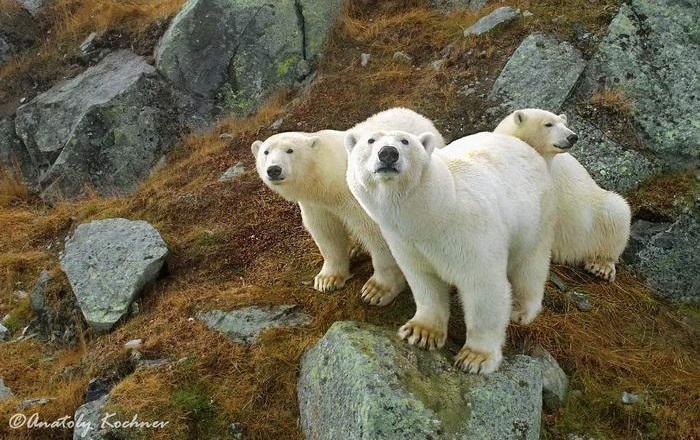
Once, six hunters from L’uren went to sea fishing, and then a storm broke out. The kayak was carried out to the open sea, dragged for several days. The hunters were very tired, but suddenly they noticed an ice field, moored to a large ice floe, and began to rest. And the ice floe was blown by the wind to unknown rocky shores. We launched the kayak and swam along the shore.
Suddenly they see a huge man sitting on top of a cliff, his legs dangling in the sea, smoking a pipe. He is taller than the tallest cliff, and his hair is like trees in a forest. The hunters are scared, but they have the courage to talk to the giant. If it’s not the size, it still looks like an ordinary person. They screamed for a long time, hoarse. Finally, the giant heard and said: “Do you hear a mosquito squeak, or something?” The words sounded like a rockfall in the mountains.
He noticed the hunters in the kayak, bent down, took the kayak sergeant, put it in his palm and brought it to his ear. “Now tell me, now I’ll understand. I am Lolgylin, and who will you be?” The foreman explained everything to him. “So you’re human too?” “People, people,” the foreman nodded, “but we don’t know how to get home.” “Well, I’ll walk you out, perhaps.”
He folded the Long tail of the hunters into a glove, and put the kayak in the same place. He put on his long saddlebags and walked across the sea as if through a swamp. Walked, walked, got hungry. He put his hand into the water, fumbled, pulled out three whales by the tails, and refreshed himself. I reached the land. The hunters looked out of the glove – the places are familiar! The giant let them go, and they were buried very quickly in their native land.
And Lolgylin says: “I’m tired of something. I’ll get some sleep,” he moved the hill to the side, freed up a place for himself and lay down to rest. Autumn storms flooded it with water, and it froze to the tundra. I’ve been sleeping all winter. It thawed out in the spring. In the summer, the bears came, and one curious bear cub climbed into the giant’s nostril. Lolgylin sneezed, the bear flew out of his nostril and rolled head over heels. The giant woke up, scratched his nose and said: “Oh, I’ve been sleeping on a foreign land for a long time. I got a cold, however.” I got up and walked back where I came from.
The surprised animals stared after him for a long time.
May 31, 2024
By Anatoly Kochnev
